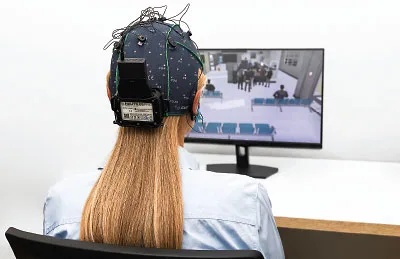Posttraumatic stress disorder, commonly known as PTSD, is a mental health condition that impacts millions of people throughout the country. A traumatic experience or incident often triggers PTSD, resulting in a range of psychological, emotional, and physiological symptoms, which disrupt daily life and cause feelings of distress. These symptoms may include recurring flashbacks, ruminating thoughts, nightmares, anxiety or panic attacks, sleep disturbances, mood changes, and avoidance of specific places or situations.
Memory impairment is a notable aspect of PTSD symptoms. The condition exerts an influence on memory processing and arrangement within the brain. It’s not uncommon for individuals to encounter memory gaps surrounding the time frame of the traumatic incident. In addition, the burden of mental and sensory stimuli from past experiences, magnified by distressing flashbacks, can also hinder the processing of fresh memories. For individuals experiencing PTSD, as well as their loved ones, understanding the relationship between memory loss and the condition is crucial. Here are some of the ways memory loss could impact an individual dealing with PTSD:
1. Incompatibility between PTSD and your hippocampus
Scientific studies indicate that post-traumatic stress disorder (PTSD) strongly affects the hippocampus, a brain region tasked with handling emotions and memories. Individuals affected by PTSD experience a reduction of up to 8% in the size of their hippocampus from its original dimensions. The deterioration of the hippocampus contributes to memory impairment, leading to heightened anxiety, flashbacks, and fragmented recollections of the past. This decline also hinders the formation of new long-term memories. The good news, however, is that this change isn’t permanent, as proper treatment can facilitate the restoration of the hippocampus.
2. Beyond Mere Forgetfulness
The repercussions of memory loss linked to PTSD extend far beyond simple forgetfulness. This form of memory impairment associated with PTSD is more than difficulty in recalling lists or information; it can introduce a sense of fragmentation or disorderliness to one’s memories, and in some cases, result in substantial memory gaps. These challenges can significantly disrupt daily activities, and it’s possible for individuals to remain unaware that these issues stem from their experience of PTSD.
3. PTSD Disrupts Sleep and Relaxation
Frequently, symptoms such as flashbacks, panic attacks, and nightmares impose significant challenges on getting restful sleep during the night. Due to the disruption in the formation of new memories, the trauma often remains fresh, making it challenging for the body to achieve adequate rest. Individuals who continually relive their traumatic experiences and encounter difficulties in creating new memories frequently experience insomnia and an inability to experience relaxation. This cycle places additional strain on both the body and the mind.
4. PTSD impacts the perception of present experiences and places
The disturbances in memory caused by PTSD can have consequences on how a person perceives their current surroundings and timeframe. PTSD has the potential to diminish an individual’s ability to differentiate the contextual elements of their environment and differentiate between recent and past memories. As a result, maintaining a sense of calmness when confronted with reminders of trauma becomes more challenging. Frequently, this response prompts individuals to avoid specific locations or scenarios, despite the huge disruption this avoidance can have on their everyday lives and routines.
5. Memory loss surrounding the traumatic event is common
Those experiencing PTSD often struggle with sequentially recounting the traumatic event leading to disorganized memories. This symptom can create challenges for the individual to properly articulate their experience to others, resulting in feelings of isolation. The presence of distortions and memory lapses can create a sense of disconnect, leaving an individual feeling incapable of establishing connections or finding common ground with others.
6. Memory loss affects emotions
Emotions and memories are both processed in the same area of the brain, forging a close connection between the two. Consequently, when memory loss stemming from PTSD comes into play, it also influences the processing of emotions. This can create challenges in recognizing personal needs as well as the needs of others, often leading to disruptions in interpersonal relationships.
7. Memory loss can affect language proficiency
In some cases of PTSD, there’s a possibility of encountering aphasia, a condition characterized by diminished language speaking or comprehension abilities due to brain impairment. This can result in challenges in comprehending spoken language or articulating thoughts verbally. The presence of aphasia frequently contributes to feelings of isolation and difficulty in forming connections with others, leading the individual experiencing this symptom to withdraw from social interactions.
8. Memory loss can trigger feelings of shame
Experiencing memory loss can often lead individuals to struggle with feelings of shame concerning their difficulties. Such memory-related challenges can strain social interactions and create a sense of isolation. Instead of withdrawing from others, it’s crucial for individuals to seek out support and adopt healthy coping strategies.
When confronting posttraumatic stress disorder (PTSD), seeking immediate and comprehensive treatment is paramount. A range of therapies and interventions exists to aid individuals with PTSD in
processing the emotions and memories tied to their trauma. At Bespoke Treatment, personalized treatment plans are tailored to each patient’s unique needs and objectives. These plans encompass a variety of psychotherapies as well as innovative alternatives like transcranial magnetic stimulation and ketamine therapy.
























